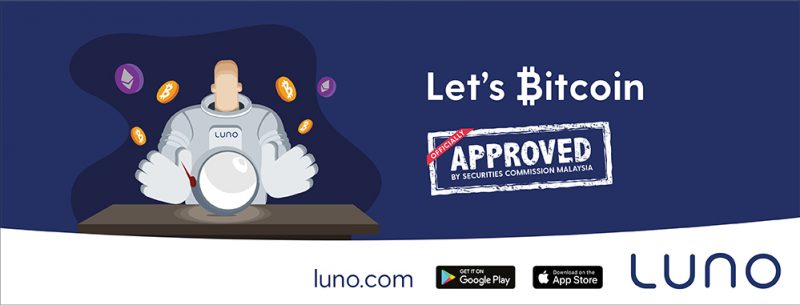Is It Safe (Or Legal) To Buy Bitcoin In Malaysia?

Table of Contents
In partnership with ![]()
Do you happen to be an investor, a trader or a tech enthusiast?
If so, Bitcoin has probably crossed your radar. Whichever camp you fall into, there’s plenty of appeal: you could diversify your portfolio by investing a small amount into Bitcoin, buy and sell Bitcoin for profit, or simply be a part of a technology that could disrupt and revolutionise industries.
In Malaysia, however, Bitcoin – and cryptocurrencies in general – have occupied a fuzzy legal area. If you’ve ever been interested in getting your hands on cryptocurrency, you may not be aware of whether it’s actually legal in Malaysia. Or how to go about buying it.
Here’s what you need to know about investing in cryptocurrencies legally and securely with Luno.
What is a cryptocurrency?
Still not quite sure what cryptocurrencies are?
A cryptocurrency is a sort of digital currency that uses cryptographic techniques to control its creation. You’ve probably heard of Bitcoin, which is currently the world’s best-known cryptocurrency.
Bitcoins and other types of cryptocurrency exist thanks to a technology called blockchain. Think of a blockchain as a public database that is distributed across many computers. Each cryptocurrency transaction is recorded in a ‘block’ of data, which is connected to other blocks of information in a ‘chain’.
Unlike regular money (like the Malaysian Ringgit), Bitcoin and the like are decentralised. This means they aren’t controlled by a central authority (such as the government). Instead, control is distributed among a large network of computers.
Are cryptocurrencies legal in Malaysia?
Digital currencies are not recognised as legal tender in Malaysia. This doesn’t mean that they are illegal, however. ‘Legal tender’ just refers to currency that is used as an official medium of payment. For example, US dollars are not accepted as legal tender in Malaysia – but that doesn’t mean that it’s illegal for you to use your Benjamins if your retailer accepts them.
The Malaysian government has even announced that cryptocurrencies will not be banned. “It is not the intention of the authorities to ban or put a stop on any innovation that is perceived to be beneficial to the public,” said the Ministry of Finance last year.
With that said, the Malaysian government does regulate digital asset exchanges – i.e. the platforms that you can use to trade Bitcoin and other digital currencies, hence any digital asset exchange that wants to operate in Malaysia has to comply with a set of regulations issued by the Securities Commissions (SC) of Malaysia. These regulations require exchanges to have robust measures in place to protect users and their assets.
How can Malaysians buy cryptocurrencies safely?
Generally, there are three ways to get cryptocurrency. You can buy it, you can mine it or you can earn it through selling products or services. Buying from a cryptocurrency exchange is the easiest way.
Technically, you don’t need an exchange to buy cryptocurrency – as long as you’re willing to find someone with Bitcoin (or your cryptocurrency of choice), agree on a price and then have them send it to your wallet (which is a software you use to ‘store’ Bitcoin). Buying from an exchange simplifies this process. It brings buyers and sellers together and gives you a wallet so you don’t have to maintain your own.
But you don’t want to buy from just any exchange.
Cryptocurrency exchanges, many of which are unregulated, have been targets of theft and fraud. More than 980,000 bitcoins have been stolen from exchanges since 2011, few of which have been recovered. Some unscrupulous exchanges have even vanished with their users’ funds, leaving investors and traders without a single cent. When you trade on an unregulated or unsecured exchange, you risk losing all your assets.
To trade Bitcoin and other cryptocurrencies safely, you’ll need to use a regulated and secure exchange like Luno.
Luno is the first digital asset exchange to be fully approved by the SC, which means that it has to comply with regulations that help ensure the safety of its users and their assets. Some of the ways Luno keeps its users’ assets safe include:
- Deep freeze storage. The majority of its users’ Bitcoins are kept in a ‘deep freeze’ storage, i.e. multi-signature wallets with private keys stored in different bank vaults. This means that no single person ever has access to more than one key, and accessing Bitcoins from deep freeze storage involves multiple layers of encryption and security checks.
- Authentication. Passwords are stored in hashed form, so nobody other than the user ever has access to their password. Two-factor Authentication (2FA) is also supported to provide another level of authentication.
- Staff requirements. Every employee has to pass a background check, receive security training and adhere to Luno’s security policy.
Although Luno has recently relaunched in Malaysia after its SC approval, the platform has been around since 2013, with over 3 million customers spanning over 40 countries.
The exchange has also made it into the top-ten of the CryptoCompare Exchange Benchmark published on November 19th, 2019.
How to start trading with Luno
Always wanted to get into cryptocurrencies, but intimidated by the complexity of it?
It’s easy to get started with Luno. Here’s how:
| 1. Sign up | Sign up for a Luno Wallet on web, iOS or Android. Follow Luno’s instructions to verify your identity and set up your profile. |
| 2. Deposit money | Choose your preferred payment method (such as bank transfer or credit card) to add money to your Luno Wallet. |
| 3. Buy crypto | Buy Bitcoin or Ethereum, then store it in your Wallet or trade it. |












